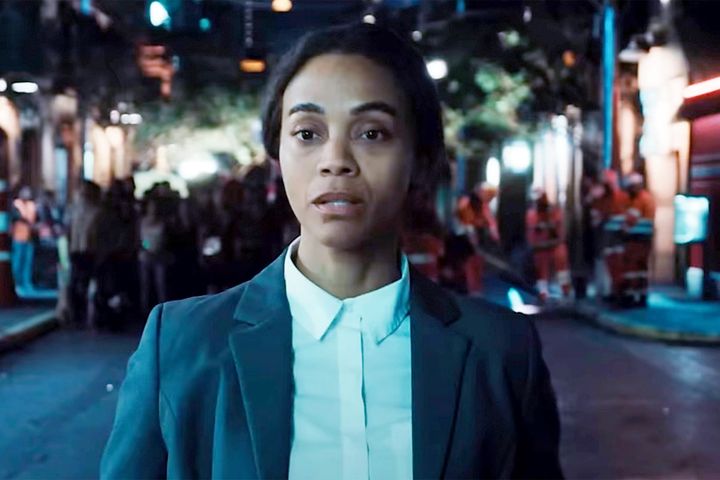
The Notorious Bettie Page shines at TIFF
There's a startlingly beautiful moment in The Notorious Bettie Page, where Bettie is alone in the woods with a photographer for one of her frequent bikini modelling shoots, and mentions that she's been thinking that there's no real reason why she should be keeping the bathing suit on at all. With typical carefree immodesty, Bettie doffs her top and then her bottom and stands up out of the foliage, facing the photographer head-on, resplendent in her natural beauty looking for all the world like a goddess of feminine empowerment. The photographer blushes and gently reprimands her. He directs her to turn away from the camera. "We can't show... that," he admonishes. He can't even bring himself to say the word "vagina," let alone photograph one.
Ah, innocent times! By the end of the picture, a Bettie Page fan is telling the now-retired Bettie about the relative tameness of her photographs compared to the more modern forms of erotica, and we believe it. It's this sense of the sweetness of Bettie's time and place in history that makes The Notorious Bettie Page so much fun. The film never aims to preach or sermonize, never makes Bettie's photography feel smutty, never would even think to demonize Bettie herself - because the film is very precisely telling us that such considerations miss the point of the Bettie Page icon altogether. She wasn't an image of transgressive sexuality at all, but rather one of freedom, self-confidence and innocence. When Bettie stopped feeling like she could be those things, she stopped taking the photographs. End of story.
That synopsis is really the only problem with Bettie Page: ultimately, it comes off feeling a bit slight. This is undoubtedly part of the point as well. Mary Harron could very easily have made a lengthy, ponderous biopic about Page; she chose instead to make a loving homage to not just Page herself, but the small slice of the 1950s where America teetered on the brink of the fundamental change between postwar innocence and pre-Vietnam revolution. I was left wanting more to chew on from the Bettie Page story, and at 90 minutes, the film is too short. Still, it's dandy while it's there. Page is an absolutely gorgeous picture, lovingly enshrining the look and feel of 1950s black and white filmmaking, while exploring the moment where we as a culture went wrong with our feelings about nudity and erotica. It's a delicate balance to hold, but Harron's approach is nothing if not well thought out. This is a very smartly-made film.
When I first heard that Gretchen Mol was going to be playing Page, I thought it couldn't be done, from body type on down. Now, I'm simply flabbergasted by the degree to which Mol succeeds in her mimicry. Without ever explaining why Page's smile unfolds the way it does when she's winking at the camera, she captures the visual perfectly. More importantly, she fills in the blank spaces: we all have seen those few, frozen moments of Page, the undying pinup images, but Mol sketches the moments that lead up to each photograph, and the moments afterwards, like a master craftsperson building a ladder to get in and out of a house with no door. She accesses Page beautifully. Mol brings to her performance a wealth of subtly-etched anxieties, shows in Page an intelligence about herself that ultimately leads her to question why she does the things she does. Mol is occasionally laugh-out-loud hilarious at it, and occasionally fairly heartbreaking. It's a tremendous performance.
There's another moment in this film, very near the end. Bettie has been sitting outside the Senate hearings on pornography for the duration of the picture (the rest of the narrative has been told in flashback), waiting for her turn to testify. Finally, a court official arrives and tells her that her testimony will not be required. Taking a moment to adjust to this news - she has been waiting twelve hours - Bettie looks up at the official and politely asks, "Will I need to come back tomorrow?" Because, of course, she would come back; would wait another twelve hours if she was asked to, because she is both hopelessly beaten by them, and yet forgivingly patient with them as well. She knows herself. In that single line, and that single look, Mol and Harron convey everything you need to know about Bettie Page. Defeated and invincible, and ready to leave the cameras behind.
Latest Videos
Latest Videos
Join the conversation Load comments







